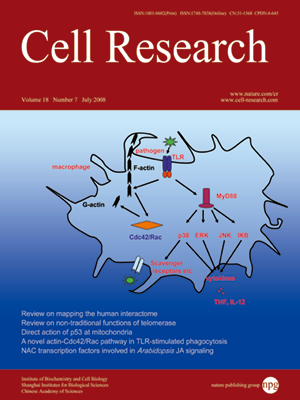
Volume 18, No 7, Jul 2008
ISSN: 1001-0602
EISSN: 1748-7838 2018
impact factor 17.848*
(Clarivate Analytics, 2019)
Volume 18 Issue 7, July 2008: 792-799
ORIGINAL ARTICLES
Angiotensin II promotes NO production, inhibits apoptosis and enhances adhesion potential of bone marrow-derived endothelial progenitor cells
Tao Yin1, Xinliang Ma2, Li Zhao1, Kang Cheng1 and Haichang Wang1
1Department of Cardiovascular Diseases, Xijing Hospital, Fourth Military Medical University, Xi'an, Shaanxi 710033, China
2Department of Emergency Medicine, Thomas Jefferson University, Philadelphia, PA 19107, USA
Correspondence: Haichang Wang(wanghc@fmmu.edu.cn )
Endothelial progenitor cells (EPCs) participate in the processes of postnatal neovascularization and re-endothelialization in response to tissue ischemia and endothelial injury. The level of EPCs present has been found to be directly associated with the outcome of cardiovascular diseases, and could be regulated by stimulatory or inhibitory factors. Given the close relationship between angiotensin II (AngII) and the cardiovascular system, we investigated the effect of AngII on the activities of bone marrow (BM)-derived EPCs. Cells were isolated from BM of rats by density gradient centrifugation. Administration of AngII significantly promoted nitric oxide (NO) release, inhibited EPC apoptosis and enhanced EPC adhesion potential. All of these AngII-mediated effects on EPCs were attenuated by pretreatment with valsartan or L-NAME. Moreover, both LY294002 and wortmannin abolished the anti-apoptotic effect of AngII. Western blot analyses indicated that endothelial NO synthase (eNOS) protein and phosphorylated Akt increased with the treatment of AngII in EPCs. Thus, AngII improved several activities of EPCs through AngII type 1 receptor (AT1R), which may represent a possible mechanism linking AngII and AT1R with angiogenesis. Additionally, AngII-induced NO synthesis through eNOS in EPCs regulates apoptosis and adhesion, and the PI3-kinase/Akt pathway has an essential role in AngII-induced antiapoptosis signaling.
Cell Research (2008) 18:792-799. doi: 10.1038/cr.2008.69; published online 17 June 2008
FULL TEXT | PDF
Browse 1949


